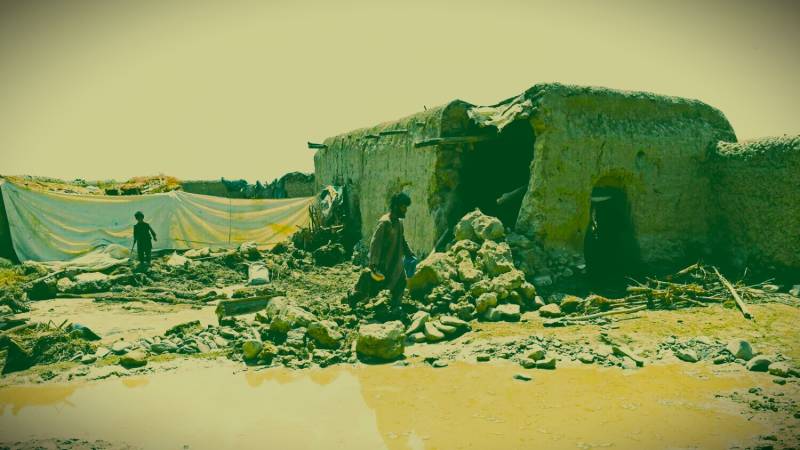
Balochistan is the largest province of Pakistan in terms of territorial size, with its vast terrain only adding to its problems. But its many and multidimensional problems have more to do with governance and policy-making rather than just the size of its landmass. Despite having vast territory and abundant resources, the province has been financially poor. It is at the lowest rung in terms of socio-economic indicators, and a majority of the province's people live under the poverty line with the bare minimum to survive.
Pakistan's national political dispensation is federal in structure. The people of Balochistan have been vehemently demanding maximum autonomy and transfer of administrative powers to the provinces. With the passage of the 18th Amendment, the demand for provincial autonomy has been realised, but just on paper. A step which should have gone a long way in resolving the province's many problems has neither addressed these problems nor has the public's resentment towards the centre decreased in any way. This is because Pakistan's federal structure has continued to remain unitary in substance, but federal only in form. It is the centre that still holds sway and continues to decide the fate of the province's people, in stark contravention of the Constitution.
The 18th Amendment is neither being implemented in letter nor spirit. This is also evident in the implementation of the multibillion-dollar China-Pakistan Economic Corridor (CPEC) project: the people are not being taken on board, and it is the centre that has the final word over everything. The centre's skewed approach towards development is evident in the bifurcation of Gwadar city, the policy of 'pocketed development', and the complete de-prioritisation of the socio-economic development of people. This policy of centralised decision-making will only be resented more fervidly by the people, as Balochistan province will remain as poor as it is now.
These entrenched and multidimensional problems have been compounded by the challenge of climate change and Balochistan's chronic vulnerability to it. The recent floods in the province laid bare the province's vulnerability to climate change, and also exposed the indifference of policymakers towards the problems that Balochistan is mired in.
Climate change-induced floods have devastated the infrastructure of the province. Floods washed away many roads in recent years, and the province remained disconnected from the rest of Pakistan for weeks. The sparse agriculture and livestock were also devastated. It was not so much the enormity and severity of floods that caused the devastation as the conspicuous lack of preparation to tackle climate change and its repercussions. Pakistan is among the world's most vulnerable countries to climate change, but the centre only appears interested in plundering the province's resources. This makes addressing climate change a lot more difficult. While there has been some realisation on the part of policymakers to recognise the challenge as serious, no substantive steps have been taken so far to correct the course.
If groundwater continues to be extracted at the same pace and scale, it will turn Balochistan into a desert
Apart from the catastrophes and calamities that climate change causes, it also affects other sectors. Parts of Balochistan are arid, while the rest is semi-arid land. For water, the province mostly depends on groundwater. The extraction of groundwater is not only expensive but increasingly unsustainable as the water table has been depleting at an alarming pace. The province has a few small dams, in which water storage is low and can hardly cater to the needs of the communities. In the recent unusual downpours and subsequent floods, many dams failed, inundating nearby villages and submerging them in water.
Climate change not only causes catastrophes in the shape of floods, but it also induces water scarcity and, worse still, droughts. The province's capital, Quetta, which has a population of more than two million people, has no natural resources left for potable water, let alone for other purposes. The water table has fallen drastically due to the heavy extraction of groundwater. The city and the province at large have become water-stressed. Agriculture and livestock sectors are not less susceptible to climate change either. The province has a meagre agriculture sector, which mostly depends on groundwater. If groundwater continues to be extracted at the same pace and scale, it will turn the land of Balochistan into a desert. The dependence on groundwater is not sustainable as it affects the entire agro-economy of the province.
The Food and Agriculture Organization (FAO) has been working on a project to address the issue of water governance and improve the overall agro-economy of the province. The 'Revival of Balochistan Water Resource Programme' (RBWRP) is being implemented in four river basins across nineteen districts of the province with the support of the European Union (EU). Two other technical partners, Landell Mills International (LMI) and International Water Management Institute (IWMI), also assist the government of Balochistan in implementing this project. Though it is a step in the right direction, it must be supplemented with similar projects by the Balochistan government. Climate change affects every sector, so there is an urgent need for coordination and cooperation among the different departments to address the enormous challenge of climate change, which is staring us in the face.
Pakistan's severe vulnerability to climate change and the unprecedented floods of 2022 should have been a wake-up call for policymakers. The centre must change its attitude towards smaller provinces, who must be empowered to take decisions for themselves. There is also an urgent need for the provinces to coordinate amongst themselves to tackle the challenge of climate change in unison. The smaller provinces, particularly Balochistan which is far more vulnerable to climate change, need to be assisted in capacity building and finances. The time for action is long overdue.

